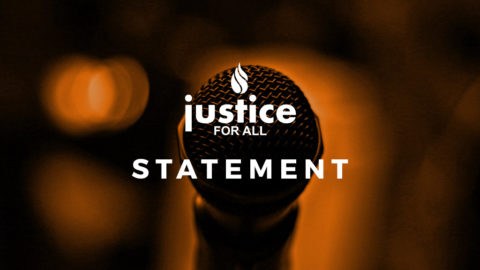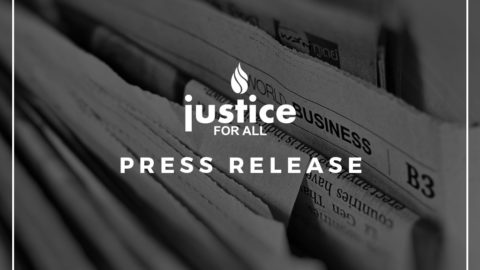Justice For All is heartened by the International Criminal Court (ICC) Prosecutor Karim Khan’s application…
URGENT STATEMENT: End Pushbacks Of Rohingya Refugees
BANGKOK, 17 April 2020
The Asia Pacific Refugee Rights Network (APRRN) is gravely concerned over reports that Malaysian maritime authorities pushed back Rohingya refugees arriving by boat on 16 April. Reports indicate Malaysian authorities refused to allow disembarkation of a fishing trawler with approximately 200 Rohingya aboard. This action comes a day after Bangladeshi authorities rescued a boat of 396 Rohingya refugees that had failed in its attempts to reach Malaysia. According to a survivor, both Malaysian and Thai authorities prevented the boat entry to their respective territories. At least 28 individuals are reported to have died over the course of the journey.
Despite not being signatories to the 1951 Convention Relating to the Status of Refugees or its 1967 Protocol, both Malaysia and Thailand are obligated under customary international law to adhere to the principle of non-refoulement: protection from return for any individual seeking asylum at risk of persecution. This principle is further underscored in the 1984 Convention against Torture, to which Thailand is party to and that Malaysia has committed to ratify.
The Government of Bangladesh deserves commendation for rescuing the boat of Rohingya refugees, but Bangladesh must not be left alone to host and provide protection to Rohingya refugees. APRRN calls on the Government of Malaysia to continue to exemplify the same humanitarian spirit it recently demonstrated, receiving and providing aid to Rohingya refugees that landed in its territory on 18 March and 5 April. The Government of Thailand should follow in Malaysia’s example, in line with commitments made by Prime Minister Prayut Chan-o-cha at the 2016 Leaders’ Summit on Refugees to increase protection for vulnerable populations and recognise the special circumstances of migrants requiring protection.
Refusal to allow access to territory is reminiscent of the 2015 Andaman Sea Crisis, when thousands of people fled Myanmar and Bangladesh by boat and the Governments of Malaysia, Thailand, and Indonesia actively prevented disembarkation. It is believed that dozens of people died at sea during the crisis.
Since the Andaman Sea Crisis, governments in the region have established several regional processes to address similar future movements. Only two months ago, the Task Force on Planning and Preparedness of the Bali Process on People Smuggling, Trafficking in Persons and Related Transnational Crime (Bali Process) met and issued a statement that “emphasised the primacy of saving lives at sea and not endangering the life and safety of persons in responding to irregular maritime migration” and “supported the principle of non-refoulement”. Malaysia, Thailand, Bangladesh, Myanmar, and Indonesia all participated in the meeting.
On 2 July 2015, during the Emergency ASEAN Ministerial Meeting on Transnational Crime Concerning Irregular Movement of Persons in Southeast Asia, the Association of Southeast Asian Nations (ASEAN) established a trust fund to support humanitarian and relief efforts resulting from irregular migration in Southeast Asia and recommended ASEAN leaders to explore possibility of setting up a Task Force to respond to similar crisis in the future. While there has been no further reports of the proposed Task Force, recent events underscore the importance of a regional preparedness and response plan.
APRRN calls on States to respect their international obligations and to invoke regional processes already established to collectively deploy immediate lifesaving search and rescue missions, ensure safe access to territory and international protection for those in need, and provide humanitarian assistance and medical treatment where required.
While APRRN acknowledges the COVID-19 emergency confronting States and their populations, APRRN reiterates that the right to life and principle of non-refoulement are non-derogable state obligations under international law. In the spirit of the Sustainable Development Goals (SDGs) which all ASEAN states have committed to, APRRN calls on States to “leave no one behind” in efforts to contain and manage the pandemic.
In the longer term, ASEAN States must address the root causes that lead to continuous displacement of Rohingya refugees and work with Myanmar towards creating conducive conditions that will prevent further displacement and allow for safe, sustainable, and voluntary returns.
APRRN calls upon the governments of Malaysia and Thailand to:
- Respect international obligations regarding the principle of non-refoulement
- Cease ‘pushbacks’, interception and other measures designed to obstruct access to territory
- Deploy immediate lifesaving search and rescue missions and provide humanitarian assistance and medical treatment where required
- Ensure safe and transparent process for asylum seekers and refugees within their territories and access to UNHCR
While APRRN statements are prepared in consultation with APRRN members they do not necessarily reflect the views of all APRRN members.
The Asia Pacific Refugee Rights Network (APRRN) is a network of 400+ civil society organisations and individuals from 28 countries committed to advancing the rights of refugees in the Asia Pacific region. APRRN aims to advance the rights of refugees and other people in need of protection through joint advocacy, capacity strengthening, resource sharing and outreach.
Media Contact:
Janeen Sawatzky, Programme Coordinator, APRRN
Tel: +66 (0) 988 932 865 Email: janeen@aprrn.info Fax: +66 2 234 2679
Themba Lewis, Secretary General, APRRN
Tel: +66 (0) 99 481 1595 Email: themba@aprrn.info Fax: +66 2 234 2679


